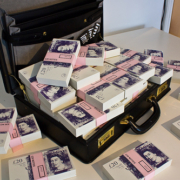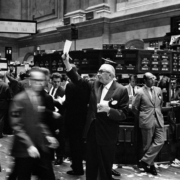Phases Of The Crisis – Are We Approaching The Endgame?
Phase 1: Greenspan, the arch money crank
The Greenspan “put”, and the collective adoption by most central bankers of low interest rates after the dot-com bust and 9/11, caused one of the largest injections of bank credit in history. Since bank credit circulates as money, we can say public policy has created the largest amount of new money in history. This should never be confused with creating new wealth. That is what entrepreneurs do when they use the existing factors of production — land, labour and capital — in better ways, to make new and better products. The money unit facilitates this exchange. Now to a money crank. He will assume that new money will raise prices simultaneously and proportionately, so the net effect of the economy is that all the ships rise with the tide at the same rate. He’ll say that money is neutral and does not have any effect on the workings of the economy. One of the great insights of the older classical economists, and in particular the Austrian School, is that new money has to enter the economy somewhere. Injected money causes a rise in the price levels associated with the industry, businesses, or people who are fortunate enough to be in receipt of the new money. Prices change and move relative to other prices. It is often quite easy to see where the new money enters into the economy by observing where the booms are. Suppose a banker sells government bonds to another part of the government (as has been the case with UK QE policy). For selling, say, £30bn of government debt to the Bank of England, he gets a staggering, eye-popping bonus. With his newly minted money, he buys a new £10m house in Chelsea, a £5m yacht in Southampton, some diamonds for the wife to keep her happy, and lives a happy and rich life. The estate agent spends his commission on a luxury car, and some more humdrum items that mere mortals buy. At each point in time, the prices of the goods favoured by the recipients of new money are being bid up relative to what they are not spending on. Eventually these distortions ripple through the economy, and the people furthest from the injection of new money — those on fixed income, pensioners, welfare recipients — end up paying inflated prices on the basic goods and services they buy. A real transfer of wealth takes place, from the poorest members of society to the richest. You could not make this up. I am no fan of the “progressive” income tax, but I certainly can’t support a regressive wealth transfer from the poor to the rich! Even when the government was not creating new money itself, it was setting the interest rate, or the costs of loanable funds, well underneath what would naturally be agreed between savers and borrowers. Bankers are exclusively endowed with the ability to loan money into existence, so they welcome the low rates and happily lend, charging massive fees to enrich themselves in the process. After the dot-com bubble, it was property prices that went up and up. Not only do we have the richer first recipients of new money benefiting at the expense of the poor, we have a massive mis-allocation of capital to “boom” industries that can only be sustained so long as we keep the new money creation growing. Our present monetary system is both unethical and wasteful of scarce resources. We do not let counterfeiters lower our purchasing power, and we should not let governments and bankers do it.
Phase 2: Bush & Brown – private debt nationalised by the Sovereign
This flood of new money brought more marginal lending possibilities onto the horizon of the bankers. They devised a range of exotic products whose names are now familiar: CDO, MBS, CDO-squared, Synthetic CDO, and many more — all created to get lower quality risk off the issuing bank’s balance sheet, and onto anyone’s but theirs! In 2007/2008, bankers started to wake up to the fact that everyone’s balance sheets were stuffed with candyfloss money, at which point they suddenly got the jitters and refused to lend to each other. As we know, bankers are the only people on the planet who do not have to provide for their current creditors; they can lend long and borrow short. Thus, the credit crunch happened when the demand for overnight money to pay short-term creditor obligations ran dry. Our political masters then decided that we could not let our noble bankers go bust; we had instead to make them the largest welfare state recipients this world has ever known! Not the £60 per week and housing benefit kind for these characters, but billions of full-on state support to bail out their banks. They failed at their jobs and bankrupted many, but they kept their jobs with 6, 7, or 8 figure salaries! Bush told us that massive state intervention was needed to save the free market. Brown said the same. We were told that there would be no cash in the ATMs and society would most certainly come to an end if heroic action was not taken to “save the world”, as Brown so memorably put it (though he seemed to think he had accomplished this feat singlehandedly). Thank God for Gordon! Now in Iceland, a country I was trading with at the time, their banks did go bust; no one could bail them out. But within days the Krona had re-floated itself and payments continued; within weeks they had a functioning economy. Within days the good assets of Lehman Bros had been re-allocated, sold to better capitalists than they. But with these notable exceptions, socialism was the order of the day. Bank’s inflated balance sheets were assumed by sovereign states. Like lager louts on a late night binge, after a Vindaloo as hot as hell itself, heads of government seemed to care little for the inevitable pain that would follow, as states tried to digest what they had so hastily ingested. Indeed, the failed organs of the nationalised banks survive only on life support, enjoying continuous subsidy through the overnight discount window. But the sovereign governments, under various political colours, had a history of binging. In our case the Labour Party spent more than it could possibly ever raise off the people in open taxes, and the Tories offer “cuts” which in reality mean that the budgets of some departments will not increase as quickly as they were planned to.
Phase 3: King Canute, sovereign default
Default is the word that can’t be mentioned. In reality, we should embrace default. This debt is never going to be repaid. Never, that is, in purchasing power terms. S&P ratings agency have hinted at this with the recent US rating downgrade. They know the American government can always mint up what it needs so long as it has a reserve currency. They also know that this is a soft default. In real terms, people seem likely to get back less than they put in. Hard default should be embraced by the smaller nations like Greece and Ireland, so they can rid themselves of obligations they cant afford to pay. This will be good for taxpayers in the richer countries of Europe, as they will no longer be bailing out those who foolishly lent to these countries. It will be good, too, for the debtor nations, as they can remove themselves from the Euro and devalue until they are competitive again. They will, however, need to learn to live within their means. Honest politicians need to come to the fore to effect this. Yes, this will be painful and the people who lent these profligate and feckless politicians the money will get burnt. However, the FT has recently seen prominent advocates for a steady 4%-6% inflation target. This is the debtors’ choice and the creditors’ nightmare, with collateral damage for those on fixed or low incomes, for the reasons mentioned above. Should we let the Philosopher Kings have their way?
“Let all men know how empty and worthless is the power of kings. For there is none worthy of the name but God, whom heaven, earth and sea obey”.
So spoke King Canute the Great, the legend says, as waves lapped round his feet. Canute had learned that his flattering courtiers claimed he was “so great, he could command the tides of the sea to go back”. Now Canute was not only a religious man, but also a clever politician. He knew his limitations – even if his courtiers did not – so he had his throne carried to the seashore and sat on it as the tide came in, commanding the waves to advance no further. When they didn’t, he had made his point: though kings may appear ‘great’ in the minds of men, they are powerless against the fundamental laws of Nature. King Canute, where are you today? We need honest politicians and brave men to step forward and point out the folly of trying paper over the cracks. Unless banks write off under-performing (or never-to-perform) securities from both the private sector and the public sector, we will progressively impoverish more and more people. Let better business people buy the good assets of the bust banks, and let them provide essential banking services. Let the sovereigns that can’t pay their way go bust and not impoverish us any further with on-going bailouts. In all my years in business, your first loss is always your best loss. Yes, this will be painful. Politicians, fess up to the people: you do not have a magic bullet and you can’t offer sunshine today, tomorrow and forever. I fear that if we do not do this, we approach the end game: the total destruction of paper money. Since August the 15th 1971, paper money has not been rooted in gold. It is the most extreme derivative product, entirely detatched from its underlying asset. Should the failure of this derivative come to pass, we will have to wait for the market to create something else. Will we be reduced to barter, as the German people were in the 20s? A process of wipe out for all will be a hell of a lot harder than sensible action now. It is still not too late.





